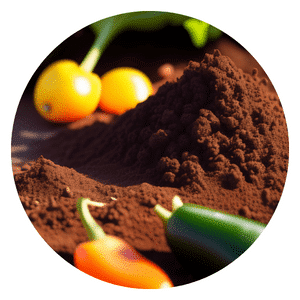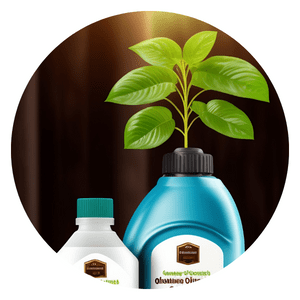Organic Eggplant Growing Methods
Organic farming practices have gained significant popularity in recent years, with an increasing number of individuals seeking out organic produce for its health and environmental benefits.
Among the many organic vegetables that have captured the attention of both consumers and growers is eggplant (Solanum melongena).
Known for its rich flavor and versatility in various cuisines, eggplant has become a staple in kitchens worldwide.
However, conventional eggplant cultivation often relies on synthetic pesticides and fertilizers, which can pose risks to human health and contribute to ecological degradation.
In response to these concerns, organic eggplant growing methods have emerged as a sustainable alternative that prioritizes both the quality of the crop and the preservation of natural resources.
Eggplant Gardening Menu
Hydroponics
One organic method for growing eggplants is through hydroponics.
Hydroponics is a soilless cultivation technique that uses nutrient-rich water to provide all the necessary elements for plant growth. This method allows for precise control over the nutrients that are supplied to the plants, resulting in healthier and more productive crops.
To grow eggplants using hydroponics, a system needs to be set up that provides a constant flow of nutrient-rich water to the root zone of the plants. This can be done using various techniques such as nutrient film technique (NFT) or deep water culture (DWC).
The roots of the eggplant plants are submerged in this nutrient solution, allowing them to absorb all the necessary elements for growth.
Hydroponic systems offer several advantages for cultivating eggplants organically. Firstly, since there is no soil involved, there is a reduced risk of soil-borne diseases and pests.
Secondly, as the nutrients are delivered directly to the roots, plants have an increased uptake efficiency leading to faster growth and higher yields.
Lastly, hydroponic systems also minimize water usage compared to traditional growing methods by recirculating and reusing water in a closed-loop system.
Aquaponics
Aquaponics is a sustainable farming method that combines aquaculture and hydroponics.
In this system, the waste produced by fish is used as a nutrient-rich fertilizer for growing eggplants organically.
By utilizing the natural symbiotic relationship between fish and plants, aquaponics eliminates the need for synthetic fertilizers and pesticides.
In an aquaponic system, fish are raised in tanks or ponds where they produce waste that contains ammonia. This waste is then converted into nitrites and nitrates by beneficial bacteria. These nitrates are essential nutrients for plant growth.
The water from the fish tanks is circulated to the hydroponic beds where eggplants are grown without soil.
The eggplant roots absorb these nutrients directly from the water, allowing them to grow efficiently and sustainably.
As the plants take up these nutrients, they help filter and purify the water before it flows back to the fish tanks, creating a closed-loop system that conserves both water and resources.
Aquaponics offers a unique way to cultivate organic eggplants while also promoting environmental stewardship.
Tower Gardening
Tower gardening is a revolutionary method that allows organic eggplant growers to maximize their space and yield.
By utilizing vertical space, growers can stack containers or use tower gardens to grow an abundance of delicious eggplants. This technique is particularly beneficial for those with limited garden space or urban dwellers who have small balconies or rooftops.
One advantage of tower gardening for growing eggplants organically is that it eliminates the need for traditional soil-based methods.
Instead, growers can use a nutrient-rich hydroponic system, ensuring the plants receive all the essential nutrients they need to thrive. This not only promotes healthy plant growth but also reduces the risk of disease and pests commonly associated with soil-based gardening.
Furthermore, tower gardening allows for easy maintenance and harvesting.
With stacked containers or tower gardens, growers can easily access each level without bending over or straining their back.
Additionally, as the plants are vertically arranged, there is less chance of branches touching the ground, reducing the risk of rot or fungal diseases.
Overall, utilizing vertical space through tower gardening provides an efficient and convenient way to grow organic eggplants while maximizing yields in a limited area.
In fields so lush, where sunbeams catch and glow, Organic eggplant sprouts with vibrant grace, No chemicals invade this sacred space, Where nature's dance, a gentle breeze bestows. Unburdened by the weight of toxic woe, Each seedling thrives amidst earth's sweet embrace, With rich compost, we nourish life's own base, And taste the fruits of organic crops we sow.
Chappy The Gardener
Greenhouse Gardening
One of the most effective methods for growing organic eggplants is through greenhouse gardening.
By creating a controlled environment inside a greenhouse, you can protect your eggplants from harsh weather conditions such as extreme temperatures, heavy rainfall, and strong winds. This is particularly important if you live in an area with unpredictable weather patterns or have a short growing season.
Inside the greenhouse, you can regulate the temperature and humidity levels to provide optimal growing conditions for your eggplants. This allows you to extend the growing season and start planting earlier in spring or continue harvesting later into fall.
By controlling these environmental factors, you can ensure that your organic eggplants receive consistent care and attention throughout their growth cycle.
Additionally, greenhouse gardening provides protection against pests and diseases that commonly affect eggplants. The enclosed space acts as a barrier against insects like aphids or flea beetles that may damage the plants or transmit diseases.
You also have better control over irrigation practices, preventing overwatering which can lead to root rot or fungal infections.
Overall, greenhouse gardening offers organic farmers a reliable method to cultivate healthy and productive eggplants while minimizing the risks associated with adverse weather conditions and pests.
Raised Bed Gardening
One of the most effective ways to grow organic eggplants is through raised bed gardening.
By planting eggplants in elevated beds, you can ensure improved drainage and soil structure, which are essential for their healthy growth. The enriched soil used in these beds provides all the necessary nutrients for the plants to thrive.
Raised beds allow excess water to drain easily, preventing waterlogging and root rot, both of which can be detrimental to eggplants.
Additionally, the elevated position of these beds helps in warming up the soil faster during springtime, providing a favorable environment for early planting. This is especially beneficial for regions with cooler climates where eggplants require warmer conditions to flourish.
Enriched soil plays a vital role in supporting the growth and development of organic eggplants.
It is usually a combination of compost, aged manure, and other organic matter that improves fertility while promoting good drainage.
The enriched soil offers better aeration and moisture retention capacity compared to regular garden soil alone.
By utilizing raised bed gardening techniques with enriched soil, you can create an optimum environment for your organic eggplant plants. This method not only enhances their overall productivity but also minimizes disease risks associated with poor drainage or nutrient deficiencies commonly found in traditional garden settings.
Container Gardening
One of the advantages of container gardening is the ability to grow a variety of vegetables in urban spaces, such as patios or balconies.
Eggplants, for instance, are perfect for container gardening due to their compact size and adaptability.
By choosing large containers with sufficient drainage holes and filling them with nutrient-rich soil, organic gardeners can successfully cultivate eggplants in these limited spaces.
When it comes to organic eggplant growing methods, it is crucial to start with high-quality seeds or seedlings from a reputable source.
Organic gardeners should avoid using synthetic fertilizers or chemical pesticides throughout the cultivation process. Instead, they can opt for natural alternatives like compost and organic pest control methods to ensure the health and vitality of their plants.
In conclusion, container gardening provides an excellent opportunity for urban dwellers to enjoy fresh homegrown produce like eggplants.
With proper planning and organic growing methods, even those with limited space can experience the joy of cultivating this versatile vegetable right at home on their patios or balconies.
Permaculture
One of the key principles of permaculture is to adopt a holistic approach by integrating eggplants into a diverse ecosystem that maximizes natural resources.
In organic eggplant growing methods, this means creating an environment where the eggplants can thrive alongside other beneficial plants and organisms.
By doing so, you create a balanced and self-sustaining system that reduces the need for external inputs.
Integrating eggplants into a diverse ecosystem allows for natural pest control.
For example, planting companion plants like basil or marigolds can help repel pests that may be harmful to eggplants.
Additionally, incorporating beneficial insects such as ladybugs or lacewings can help keep pest populations in check. This reduces the reliance on chemical pesticides and promotes a healthier overall ecosystem.
Furthermore, integrating eggplants into a diverse ecosystem maximizes natural resources such as water and nutrients.
Planting nitrogen-fixing cover crops like legumes or using mulch made from organic matter helps improve soil fertility while retaining moisture in the soil. This reduces water usage and minimizes nutrient leaching, leading to more sustainable and resilient organic farming practices.
In conclusion, adopting a holistic approach through integrating eggplants into a diverse ecosystem not only benefits the growth of these vegetables but also contributes to overall environmental sustainability in organic farming methods.
By promoting natural pest control measures and maximizing natural resources, we can create resilient systems that support healthy plant growth while minimizing negative impacts on the environment.
Companion Planting
Companion planting is a widely used technique in organic eggplant growing methods.
When it comes to enhancing growth and deterring pests, combining eggplants with compatible plants like basil or marigolds can be highly beneficial.
Basil is not only a great culinary herb but also acts as a natural insect repellent for eggplants.
Its strong aroma helps deter pests such as aphids, spider mites, and whiteflies that are common threats to the health of eggplants.
Marigolds, on the other hand, have long been known for their pest-repellent properties. These vibrant flowers release chemicals into the soil that repel nematodes and other harmful insects.
Planting marigolds around eggplants creates a protective barrier against pests while also adding beauty to the garden.
In addition, these bright flowers attract beneficial pollinators like bees and butterflies, which play an essential role in fertilization and overall plant health.
By incorporating companion planting techniques such as pairing eggplants with basil or marigolds in organic gardening practices, growers can enjoy increased growth rates and healthier plants while minimizing the need for pesticides.
This sustainable approach not only promotes biodiversity but also ensures the production of high-quality organic eggplants that are free from chemical residues.
Intensive Gardening
Intensive gardening is a popular technique used to maximize yields in limited garden spaces.
By closely planting eggplants in well-organized patterns, organic gardeners can optimize space and significantly increase overall yields. This method involves planting the eggplants closer together than traditional spacing recommendations, typically around 12 inches apart.
One advantage of intensive gardening is that it allows for better use of available resources such as water and nutrients.
When plants are planted closely together, their foliage creates shade that helps retain soil moisture and reduce evaporation.
Additionally, the dense planting encourages competition among the plants for nutrients, resulting in more vigorous growth and healthier plants.
Furthermore, growing eggplants in well-organized patterns not only optimizes space but also facilitates easier maintenance and harvesting.
By arranging the plants in rows or grids, gardeners can easily access each plant for pruning, fertilizing, and pest control purposes.
Harvesting becomes efficient as well since all plants are conveniently grouped together within close proximity.
Overall, intensive gardening with carefully planned layouts proves to be an excellent approach for organic eggplant growers seeking higher yields from limited garden spaces.
No-Till Gardening
One of the key organic eggplant growing methods is no-till gardening.
By avoiding tilling, farmers can preserve soil structure and reduce soil erosion.
Tilling disrupts the natural balance of microorganisms in the soil, which are crucial for nutrient cycling and plant health.
No-till gardening allows these beneficial organisms to thrive and maintain a healthy ecosystem within the soil.
In addition to preserving soil structure, no-till gardening also helps to reduce soil erosion.
When the soil is left undisturbed by tilling, it forms a protective layer that prevents water runoff and reduces the risk of erosion. This is particularly important for organic eggplant farming as erosion can lead to nutrient loss from the topsoil, affecting plant growth and productivity.
To further support the growth of eggplants in a no-till garden, adding compost is essential.
Compost serves as a rich source of organic matter that nourishes the plants while improving overall soil health.
It helps retain moisture in sandy soils or drains excess water in clayey soils, creating an optimal environment for eggplants to thrive organically without relying on chemical fertilizers or harmful pesticides.
Vermiculture
One effective organic method for nourishing eggplants and enhancing soil fertility is through the use of worm castings.
Worm castings, also known as vermicompost, are the rich dark-brown waste material produced by earthworms. These castings are packed with essential nutrients and microorganisms that promote healthy plant growth.
When worm castings are added to the soil around eggplants, they provide a slow-release source of nutrients such as nitrogen, phosphorus, and potassium. This helps in providing a balanced diet for the plants throughout their growing season.
Additionally, these castings improve soil structure by increasing its water-holding capacity and promoting better drainage.
Furthermore, worm castings contain beneficial microorganisms that help suppress harmful pathogens in the soil. These microorganisms create a favorable environment for beneficial bacteria and fungi to thrive.
As a result, the overall health of the soil is improved, leading to stronger and more resilient eggplant plants that are less susceptible to diseases and pests.
By utilizing worm castings as a natural fertilizer in organic eggplant growing methods, farmers can not only nourish their plants but also maintain sustainable soil fertility practices.
Crop Rotation
One effective organic eggplant growing method is crop rotation.
By rotating eggplants with different plant families, soil depletion can be prevented and pest and disease issues can be reduced.
Crop rotation involves alternating the types of crops planted in a specific area over several seasons or years.
Eggplants belong to the nightshade family, which includes tomatoes, peppers, and potatoes.
Rotating eggplants with plants from different families helps break up disease cycles that may affect specific plant families.
For example, if eggplants are continuously grown in the same area year after year, it can lead to an accumulation of pests and diseases that specifically target this plant family.
By implementing crop rotation strategies, the risk of soil depletion is also minimized as different crops have varying nutrient requirements. This practice allows for more balanced nutrient uptake from the soil while also reducing the chances of certain pests and diseases becoming established in a particular area over time.
Overall, crop rotation is an important technique for maintaining healthy organic eggplant crops while promoting long-term sustainability in agriculture.
In conclusion, organic eggplant growing methods offer numerous benefits for both the environment and our health.
By eliminating the use of synthetic pesticides and fertilizers, organic farming helps protect ecosystems and reduce water pollution.
Additionally, organic eggplants are free from harmful residues and contain higher levels of nutrients compared to conventionally grown ones.
Furthermore, organic farming practices promote soil health and biodiversity, contributing to long-term sustainability.
With these compelling advantages, it is clear that choosing organic eggplants not only supports a healthier lifestyle but also supports a more sustainable future for our planet.
Start incorporating organic eggplant into your diet today and make a positive impact on your health and the environment!
Click To Grow
Helps Us Grow – Share If You Like
















